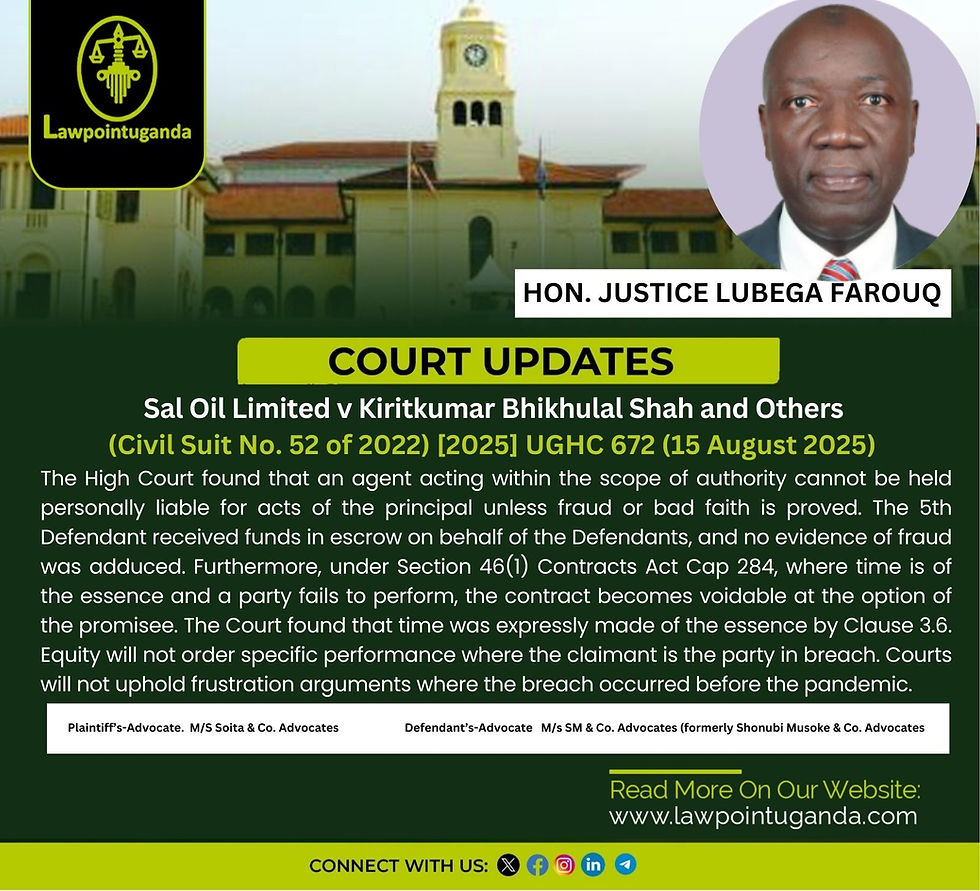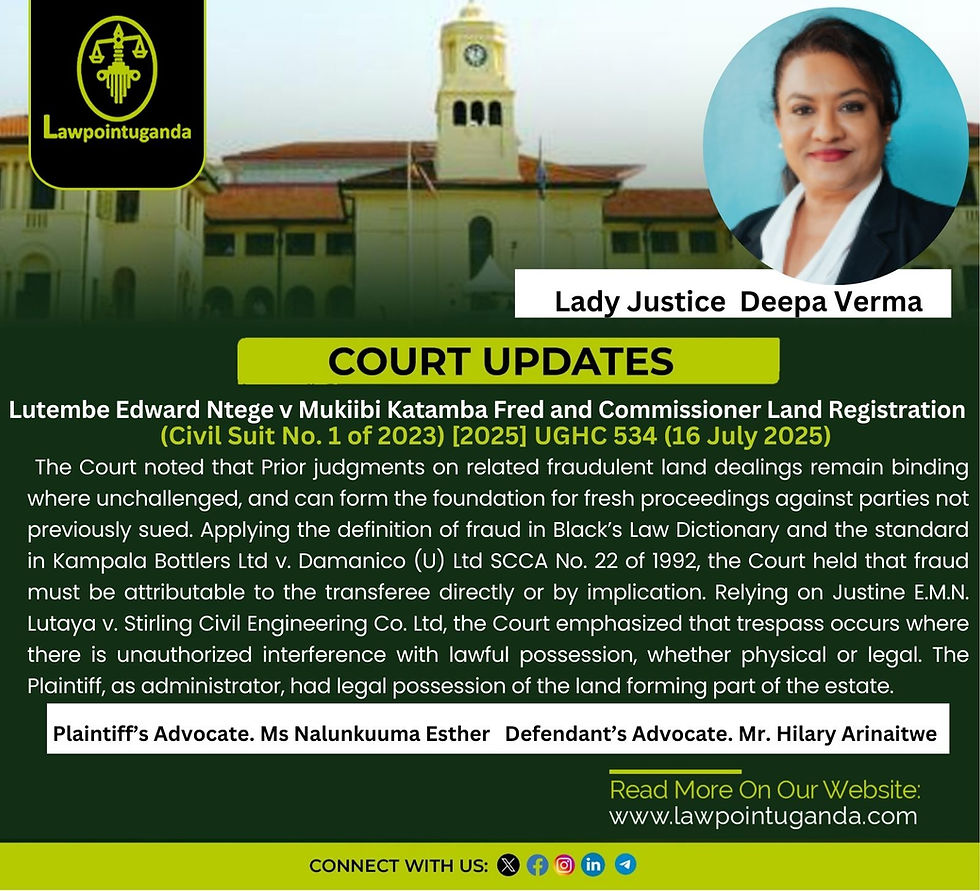High Court affirms that a purchaser cannot acquire a valid interest in customary family land from a non-owner, especially where due diligence is lacking.
- Waboga David

- Aug 17, 2025
- 6 min read

Introduction
The doctrine of nemo dat quod non habet, derived from Latin, literally means “no one can give what they do not have.” In property and contractual transactions, this principle emphasises that a transferor cannot confer a better title than what they themselves possess.
Ugandan courts have consistently applied this doctrine in land disputes, albeit with a measure of flexibility where considerations such as bona fide purchasers for value without notice arise.
Section 29 of the Sale of Goods and Supply of Services Act Cap 292 encapsulates this rule, providing that where goods are sold by a person who is not the owner and lacks authority or consent of the owner, the buyer acquires no better title than the seller had. Although this statutory provision is tailored to goods, the courts have extended the underlying principle to land transactions, particularly where customary family land or estate property is involved.
For instance, in Kaheeru v Kabazarwe (Civil Appeal No. 30 of 2024) [2024] UGHC 980 (18 October 2024), the High Court reaffirmed that one must have good title in order to pass valid ownership. The Court upheld the transfer of land where the evidence showed a proper chain of ownership, from the original seller through subsequent purchasers, and rejected claims that the land constituted matrimonial or family property.
By contrast, in Ngirabakunzi Denis v Habagatsi James (Civil Appeal No. 12 of 2023) [2025] UGHC 465 (30 June 2025), the Court applied the nemo dat principle strictly, holding that a widow could not purport to gift property forming part of her late husband’s estate without obtaining letters of administration. Such a transaction was void because she herself lacked valid title to transfer.
In the recent case of Cheptoris Judith v Sande Alex and Another (Civil Appeal No. 142 of 2024) [2025] UGHC 673 (15 August 2025) , the High Court has again invoked the doctrine of nemo dat quod non habet to emphasise that a purchaser from a non-owner cannot acquire a valid interest in customary family land absent due diligence or proper authority.
The decision reinforces the need for purchasers to exercise vigilance in land transactions, especially where customary family land or estate property is involved, and illustrates the courts’ readiness to void transactions tainted by defective title.
Facts of the Case
The Appellant (Plaintiff in the trial court) filed Civil Suit No. 016 of 2021 in the Chief Magistrate’s Court of Kapchorwa seeking declarations that she was the rightful customary owner of one acre of land at Kongel village, Kaptum Parish, Kaptum Subcounty, Kween District. She further sought vacant possession against the 2nd Respondent, a permanent injunction, general damages for trespass, mesne profits, and costs of the suit.
The Appellant’s case was that upon her marriage to the late Hiltler John in 1977, she was allocated the suit land which she occupied peacefully until 2014. She alleged that the 1st Respondent (her son) had only been granted temporary use of the land but, without authority, purported to mortgage and later sell it to the 2nd Respondent. The matter was reported to local authorities, where the 1st Respondent agreed to refund the 2nd Respondent’s money but failed to do so.
The 1st Respondent admitted that he had only been allowed temporary use of the land by his parents in 2008 and later mortgaged it to the 2nd Respondent for UGX 3,000,000. He conceded that the land still belonged to the Appellant and that the family had never formally subdivided the family land.
The 2nd Respondent, however, maintained that he lawfully purchased the land during the lifetime of the Appellant’s husband, through the 1st Respondent, who he claimed had been given the land as a gift inter vivos. He argued that the purchase money was used to fund the 1st Respondent’s marriage obligations and the medical treatment of the late Hiltler John.
Submissions
Appellant’s submissions:
The Appellant argued that she and her children, including the 1st Respondent, held the suit land as family land and no permanent allocation had ever been made to any individual.
The 1st Respondent had no authority to mortgage or sell the land, and any transaction with the 2nd Respondent was void.
She emphasized that a buyer from a non-owner cannot acquire valid interest in customary family land absent due diligence or proper authority.
1st Respondent’s submissions:
He admitted temporary use but denied authority to sell.
He contended that any agreement of sale was questionable, possibly forged, and reiterated willingness to refund the UGX 3,000,000 to the 2nd Respondent.
2nd Respondent’s submissions:
He argued that the land had been gifted to the 1st Respondent as an inter vivos gift and thus validly sold to him.
He submitted that he purchased in good faith during the lifetime of the Appellant’s husband, and the proceeds benefitted the family (bride price and medical expenses).
Issues on Appeal
Whether the Appellant had a legal interest in the suit land.
Whether the land was gifted inter vivos to the 1st Respondent.
Whether the 2nd Respondent was a trespasser.
Whether costs were properly awarded.
Whether the trial magistrate’s decision occasioned a miscarriage of justice.
Court’s Findings
The Court considered Grounds 1 and 2 together, addressing whether the Appellant had a legal interest in the suit land and whether the trial court erred in its evaluation of evidence regarding a gift inter vivos.
On the alleged sale agreement
The 1st Respondent contended that he had mortgaged the land, while the 2nd Respondent insisted that he had purchased it under two agreements (DEX.1 and DEX.2).
The Court held that this discrepancy demonstrated lack of consensus ad idem, an essential element of a valid contract under Section 9(1) of the Contracts Act.
Moreover, the signatures on the agreements differed, and no evidence of proper attestation by local authorities was adduced. Relying on Greenboat Entertainment Ltd v. City Council of Kampala, the Court found that no valid contract existed between the 1st and 2nd Respondents.
On the alleged gift inter vivos:
Both the Appellant and the 1st Respondent testified that the land had only been given to the latter for temporary use, pending formal subdivision. For a gift inter vivos to be valid, there must be both intention to donate and acceptance by the donee. Citing Halsbury’s Laws of England and Joy Mukobe v. Willy Wambuwu, the Court held that no such intention or acceptance existed. The 1st Respondent therefore never acquired ownership rights over the suit land.
On due diligence by the 2nd Respondent:
The Court emphasized that buyers are obliged to conduct thorough investigations before acquiring land, as reiterated in Jennifer Nsubuga v. Michael Mukundane and Sir John Bagire v. Ausi Matovu. Despite knowing the Appellant and her late husband, the 2nd Respondent failed to consult them or local authorities regarding ownership. This omission, in light of prevailing land disputes in Uganda, amounted to negligence that could be construed as fraud.
On legal ownership and interest:
Since the 1st Respondent only had temporary use rights, he lacked legal interest in the land and could not pass title to the 2nd Respondent. As Byamugisha J stated in Ojwang v. Wilson Bgonza, a purchaser can only derive interest from a seller with recognized title. The Court concluded that the land remained the property of the Appellant and her late husband.
On trespass (Ground 3):
The Court held that the 2nd Respondent’s occupation did not amount to trespass because he entered the land with permission from the 1st Respondent, who had been authorized temporary use. His occupation therefore was not unlawful.
On costs (Ground 4):
The trial court was correct in awarding costs to the 2nd Respondent as the then-successful party, in line with Section 27 of the Civil Procedure Act.
On miscarriage of justice (Ground 5):
Having found that the trial magistrate wrongly dismissed the Appellant’s claims despite clear evidence of her interest in the land, the Court held that a miscarriage of justice had occurred.
Holding
The appeal succeeded on Grounds 1, 2, and 5, but failed on Grounds 3 and 4.
The judgment and orders of the trial court were set aside.
It was declared that the suit land belonged to the Appellant and her late husband.
The 1st Respondent was ordered to refund UGX 3,000,000/= to the 2nd Respondent within 30 days.
Costs of both the appeal and the trial were awarded to the Appellant.
Read the full decision





.jpg)

Comments